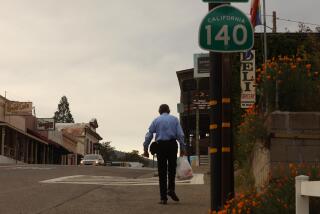Irwindale Faces Age-Old Question of How to Care for Senior Citizens
- Share via
IRWINDALE — It used to be that parents in this tiny city could rest assured their youngsters would find a job close to home, marry a local resident and stay to take care of them in their old age.
After all, they did the same for their folks. And so did the generation before.
But times are changing in the city of 1,100. For the first time, Irwindale, incorporated in 1957, is faced with a group of senior citizens who say they desperately need public housing.
Some are longtime residents whose sons and daughters have moved away in search of better jobs. Others live on their own, but they are finding it increasingly difficult to care for themselves.
Officials are considering the use of a city-owned lot to build a single-story residence for the elderly and are conducting a survey to find out just how many older residents there are.
Nine of them, identified in a preliminary survey by Irwindale’s Senior Citizen Center, say they’ve fallen through the cracks of a traditional support system that the city has taken pride in generation after generation.
“We’re a very close-knit town. The majority of us are family,” said Assistant City Manager Fred Herrera. “If I ever become an invalid, one of my children would stay here for me. If I died, they’d take over and this would become their house.”
That’s how it’s been for most folks in Irwindale over the past three decades. But not all of them.
Rose Salinas, 65, lives in a tiny one-bedroom house at the end of Nora Avenue, spending $250 of her $474 monthly Social Security check on rent. She speaks candidly, saying she lost contact over the years with her two daughters and her son.
“It’s just me and my dog, Dukie,” Salinas said, stroking the half-pit bull, half-Labrador retriever. “We’re not like the rest here. We’re not part of a family. Like where some people live, it’s all family. Almost the whole block belongs to the family.”
Salinas wasn’t always on her own. In 1942, she married Pasqual Breceda, the brother of Joseph Breceda, now a city councilman. They had a son, Ronnie, and moved to Irwindale to be close to Pasqual’s family. But they divorced in 1945, and shortly afterward Salinas moved to El Monte, where she found a job as an electronics assembler.
Two years ago, after a second divorce, she returned to Irwindale, this time without a family.
“I guess I was a Gypsy,” she said. “I’ve always been very independent. But lately luck’s been bad for me.
“I was in bed for three weeks with the flu,” she said. “I always wonder, if I get really, really sick who will take me to the hospital? Or if I die, when will they find me?”
Others are being forced out of their homes. Lorenza Burciga, 63, said her landlord is about to evict her because she can’t afford higher rent on her one-bedroom apartment. Maria Garcia, 56, says her daughter and son-in-law are expecting their first baby soon and will need more space in their two-bedroom house on Irwindale Avenue, where Garcia now rents a room.
One woman said the city’s response is overdue. “We’ve been asking for senior citizen housing for a long time,” said Carmen Gomez, 69, whose daughter and son-in-law are selling the family’s house on Hidalgo Street and moving away. Since her husband died in 1978, Gomez’s children have left the city, one by one, in search of employment.
“When (council members) were campaigning, they said yes,” Gomez said. “Then all of a sudden they forget. They were too busy making Irwindale beautiful to bring attention to us.
“First it was a plaza, and then a park and then more buildings. Then they were too busy trying to win the Raiders. This is the first time they’re listening to us.”
Mayor Salvador Hernandez acknowledged that senior citizens’ needs may have been pushed aside in the midst of Irwindale’s dramatic transformation from gravel pit capital to thriving industrial center. Now, he said, more emphasis is being placed on affordable housing, and the city’s redevelopment agency has subsidized several projects for low-income families.
More to Read
Sign up for Essential California
The most important California stories and recommendations in your inbox every morning.
You may occasionally receive promotional content from the Los Angeles Times.










